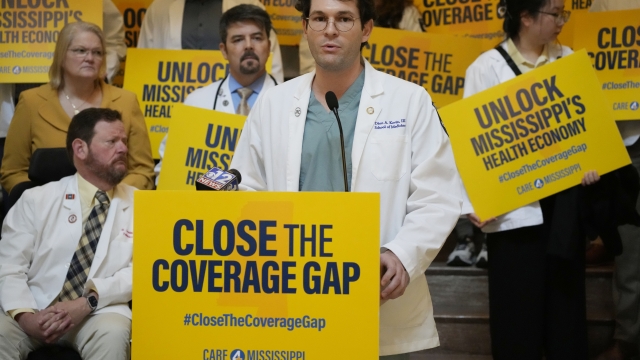Health care costs are on the rise and a recent poll shows the high cost of health care is a burden on American families. One in four adults said it's difficult for them to afford prescription drugs, a pain point that was noted by President Joe Biden.
The non-profit health care research organization KFF reported in a poll that nearly 153 million Americans have job-based health insurance, the largest form of coverage by far.
Over the last 10 years, insurance premium costs paid each year by employers and their workers have risen by nearly $8,000.
According to the poll, many families said lowering their out-of-pocket health care costs is their top health care priority.
"We kind of hate going to the mailbox because every day that we go we just get something new," said Lindsey Wilson, a resident of Parker, Colorado. "In our case, I am going through extensive use of the health care system lately. Our costs in the last five years I think has possibly doubled."
Like many people across the country, Wilson said she is feeling the weight of increased health care costs.
"Our premium is $11,000 a year that we pay to our insurance," Wilson said. "And then, just recently I have had a procedure planned for maybe like two or three months and I just got a denial that it is not covered."
Like about half of adults surveyed across the country by KFF, Wilson said It's difficult to afford health care. One in four respondents to KFF's poll report that they or someone in their family had problems paying for health care in the last 12 months.
"The trend has been that premium cost, the amount people pay out of pocket, and the sum that people might be paying in total, either through employers or taxpayers' premiums, have gone up faster than wages or other forms of inflation," said Krutika Amin, a policy expert with KFF.
According to KFF, the annual cost of employer-sponsored family health insurance coverage soared to an average of nearly $24,000 in 2023. Ten years ago, the average total was about $7,600 less.
Employees are shelling out an average of $6,575 for their share on a family policy. On coverage for a single person, it's just over $1,400 for the worker.
"Health care prices are also going up more recently because wages for nurses and doctors went up during the pandemic to keep providers on staff," Amin said. "Newer drugs coming to market are very expensive. Drugs are also priced higher in the U.S. than other comparable nations. So, these things add up."
"I also take a thyroid medication because I've had half of my thyroid removed," Wilson said. "Recently my insurance does not approve it. And I have not had the time to call and work on this to get it covered. So, it's possible that I need to pay $75 every three months on top of the high deductible."
The polling shows families are also feeling the burden of increased prescription drug costs.
According to KFF, one in five adults say they've not filled a prescription because drugs cost too much. And one in ten are making prescriptions last longer by skipping doses or cutting pills in half.
SEE MORE: These are the healthiest and unhealthiest cities in the US
Trending stories at Scrippsnews.com



